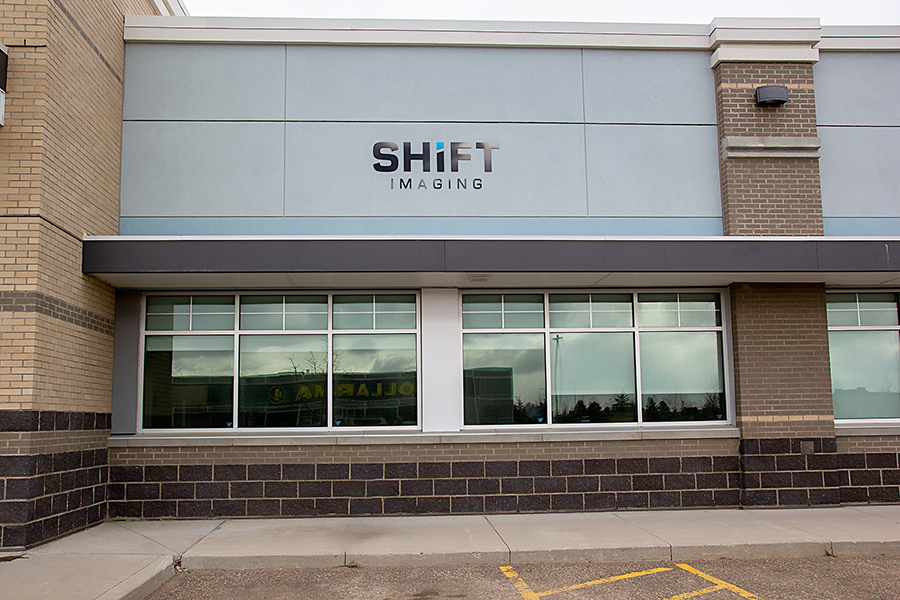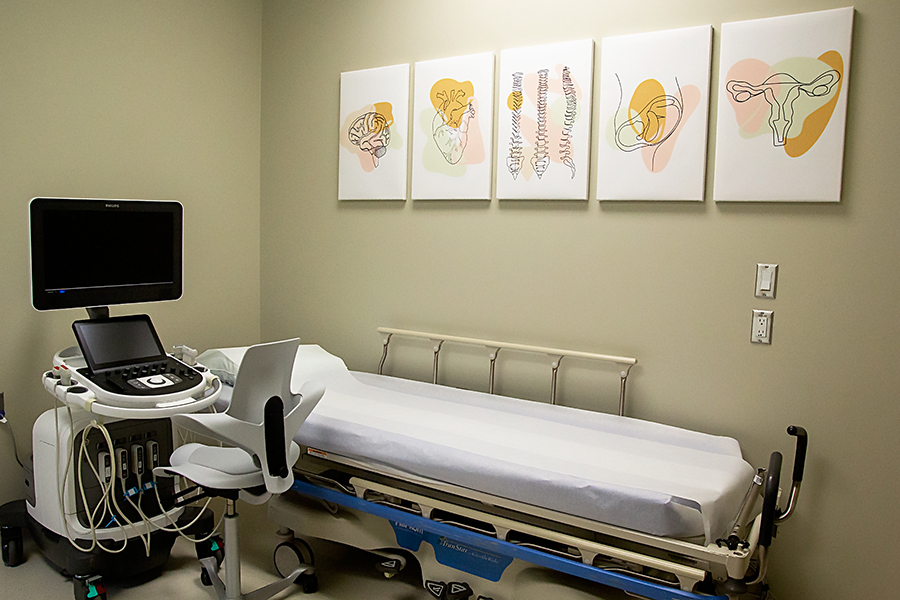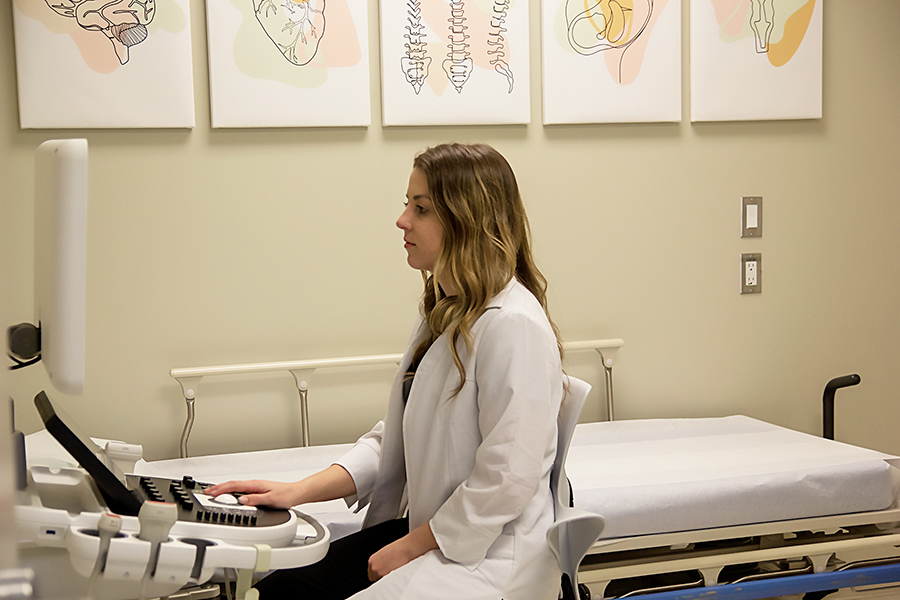A single phone call changed Amy Bespalko’s career and improved her community
A single phone call put Amy Bespalko’s career on an unexpected new trajectory. When Bespalko (Diagnostic Medical Sonography ’19) dialled the number, in the summer of 2021, she was planning to ask about a job at a medical-imaging clinic.
By the time she hung up, she’d somehow agreed to start her own instead, in her hometown of St. Paul, 200 kilometres northeast of Edmonton, where no such clinic previously existed.
“Is that even allowed?” Bespalko remembers thinking, with a mixture of shock and confusion. “Can a 23-year-old ultrasound tech who went to school for two years open her own clinic?”
As it turns out, she can. Shift Imaging opened its doors in St. Paul earlier this year, providing diagnostic ultrasound services for the town and several surrounding communities in east-central Alberta. Bespalko’s branch is the third franchise for the company, which was founded by Adrian Reagan, with other locations in Grande Prairie and Fairview.
The new clinic doesn’t just fill a gap in terms of medical services. It shows that smaller communities can attract and retain talent in the face of an overall population shift to larger urban centres. But as Bespalko’s story would show, that can take determination and patience.
Addressing the needs of the community

By the time Bespalko first contacted Reagan, she already had her sights set on returning to her hometown. After graduating from NAIT, Bespalko worked as a sonographer in Edmonton and then in Grande Prairie – but only because the hospital back in St. Paul wasn’t hiring.
Her initial pitch to Reagan was: “If you’re ever interested in opening a clinic in St. Paul, I will come work for you.” But they quickly realized that it made more sense for Bespalko to run the clinic herself, under the Shift brand, since she already knew not just the local community, but also its needs.
“I was born and raised here,” she says. “I have always known that it’s been underserved. We’ve always struggled even to keep doctors and provide imaging. I just knew it was something that was needed.”
The St. Paul branch of Shift provides a range of diagnostic services that were not previously available to the town of approximately 6,000 people. These include echocardiography, nuchal translucency (which estimates the risk of a baby being born with Down syndrome), peripheral arterial ultrasounds and soft-tissue ultrasounds.
By bringing these services directly into a smaller community like St. Paul, Bespalko and Shift are making health care more accessible and convenient than ever before.
They quickly realized that it made more sense for Bespalko to run the clinic herself.
“It’s a huge benefit for patients to not have to make such a long commute, especially on our roads in winter, plus the costs and the time involved,” says Joy Young, an instructor and clinical liaison at NAIT’s Diagnostic Medical Sonography program (and ’08 grad).
“It’s great if they don’t have to travel so far, especially for something as simple as an ultrasound.”
Maureen Miller, mayor of St. Paul, agrees. Miller was already one of Bespalko’s biggest fans – she happens to have known the entire Bespalko family since Amy was a child – and she says that the arrival of the new clinic has made the imaging process much simpler.
As an example, Miller says the local hospital is unable to provide imaging of any kind for children under the age of seven. Before Shift opened its doors, if a young child felt ill after something as simple as swallowing a penny, they would have to be driven all the way to Edmonton for treatment.
From brainstorming to opening day

While the idea for the clinic came together quickly, the journey to actually opening for business proved much trickier.
After spending months applying for loans, purchasing computers and equipment, and hiring a receptionist, Bespalko sent in her package to the provincial accreditation body. Her plan was to open the clinic to the public on Nov. 1, 2021, pending a final in-person visit and approval from the college.
But at the last minute, the College of Physicians and Surgeons of Alberta contacted Bespalko and told her that her application was on hold. The college was revising standards for certain procedures for all clinics.
Weeks passed, and then months. Another review was scheduled for February before it, too, was postponed. Meanwhile Bespalko was paying rent, an employee’s salary, and loan interest – on a business that was ready to open its doors, but wasn’t allowed to.
“I definitely fought hard for this.”
At times Bespalko questioned her decision to open the clinic in the first place. But she was buoyed by the support of the community around her, who recognized the value of the clinic and advocated on her behalf.
Miller, for one, contacted their local MLA to explain the situation, and gathered letters of support from three surrounding First Nations about the needs the clinic would fulfill.
Finally, the approval came on April 1 – a date that Bespalko still notes with humour. Shift opened to the public later that month, and has been in business ever since.
“I definitely fought hard for this,” Bespalko says. “It would’ve been easy for me to give up and just wait for a hospital position to open up. But knowing that it was needed made me want to keep pushing.”
She says the only thing that would have stopped her is if she had completely run out of money.
Plans for the future

With those speed bumps hopefully now behind her, Bespalko is already looking forward to expanding her services to the community in the coming months, including mammography and outpatient x-ray, were she to be permitted. No matter what, she remains grateful for the opportunity in front of her.
“It’s just where I wanted to be,” she says. “It’s not about making more money or having more clients. It was more about getting these services to St. Paul, because this is where I want to be and where I want to raise a family. There aren’t a lot of communities that can say they have an ultrasound clinic like ours.”
Bespalko’s commitment to her work doesn’t surprise those who know her.
“She’s a bright light,” says Miller. “She’s energetic, she’s compassionate about the work that she does, and she’s committed to improving health care.
“I would call her an ambassador for our community, and the people who live here know that.”